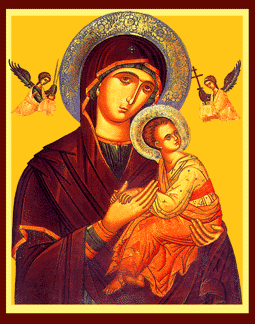Theotokos (Mother of
God)
 Let
us come now, with reverence and awe, to the greatest mystery
of all - the virgin birth of Him Who pre-existed all
existence, of Him Who is Existence itself. We do not propose
to explain the mystery, to tell how the womb of a woman born
in like manner as us could "contain Him Whom the whole
universe cannot contain." Rather, we hope merely to clear up
some of the questions arising from the facts.
Let
us come now, with reverence and awe, to the greatest mystery
of all - the virgin birth of Him Who pre-existed all
existence, of Him Who is Existence itself. We do not propose
to explain the mystery, to tell how the womb of a woman born
in like manner as us could "contain Him Whom the whole
universe cannot contain." Rather, we hope merely to clear up
some of the questions arising from the facts.
Mary is the "mother of God." The title "Theotokos" means, literally, "the one who gave birth to God." At first consideration, and without some prayerful and Scriptural thought about these titles, they may sound shocking. How can a human, born under the fallen nature,
be "the mother of God." Surely we should call her only, "the mother of Jesus," or, "the mother of Christ," When we ask the question, "should we call Mary 'mother of God,' or only 'mother of Christ,' we suddenly realise that this question is not about Mary, but about Jesus Christ Himself. The actual question is this:
"Is Jesus only a special, anointed, Grace-filled servant of God, or is He, in very truth, God incarnate?"
In other words, "Do we.believe in the Holy Trinity or not?" If we believe in the Holy Trinity, and Christ is truly God incarnate, then, of course, Mary is the "mother of God", "the Theotokos." If we reject the dogma of the Trinity and we believe that Jesus is only a specially anointed prophet, then we would refuse to call Mary "Theotokos," or "mother of God." We cannot have it both ways without playing blasphemous word games with the nature of our Saviour, Jesus Christ.
We will not pause to discuss this point at length, for it is simply resolved by the question, "Do you believe in Jesus Christ as your God and Saviour, or do you consider Him to be only a special human prophet?" We will take time only to repeat that this mystery cannot be grasped without prayerful, Scriptural contemplation of the matter. Some sectarians suggest that it would be better to think of Mary as the mother of only the human side of Jesus, the man.
Such a suggestion is made from weak human emotions and without thought or any form of Scriptural consciousness. If we said that the child in Mary's womb was not the complete Person, the incarnate God, then we are faced with several problems. First, it would mean that, for a time, Jesus was not God, then later, He became God, This is what some of the Gnostic heretics taught, and it is really Theosophy to say this. In the case of most sectarians, however, it is said only from ignorance and lack of serious thought about the matter. The other problem is that in Christian arguments against legalised "cosmetic" abortions, we argue that the fetus is a complete person, body and soul at conception. The teaching that only part of Jesus' nature was present in Mary's womb, and that His nature was completed later, after His birth, would seem to help justify random abortion, for it means that the fetus is not the complete person. Moreover, if we accept two "births" of Jesus, one in which He was born only as a human, then Jesus was also under the fallen human nature, and Himself in need of redemption. His second "birth" in which God entered Him and made Him half God and half man, would be a completely occult, "new age" type of concept.
Thus, to be an actual Christian, and not a neo-gnostic who only borrows the name "Christian," one must accept that Mary is truly the Theotokos, the mother of God.
from The Ever-Virginity of Mary, The Title
Theotokos, and The Veneration shown to Her,
by Archbishop Lazar Puhalo, Synaxis Press, p. 1-2.